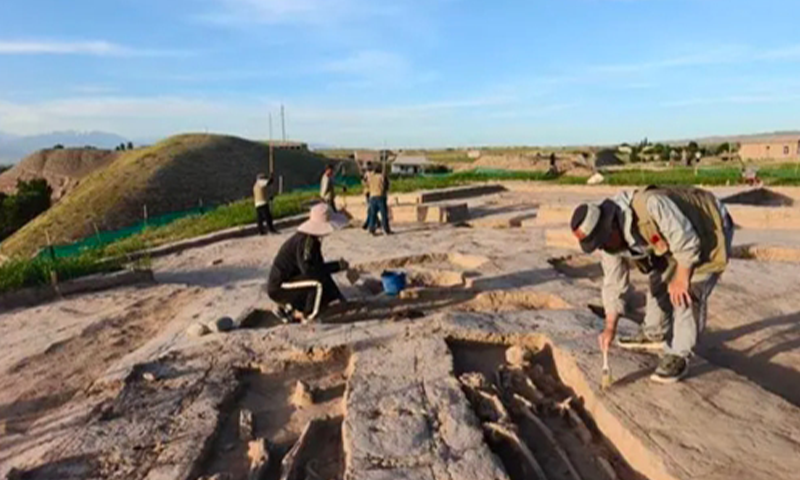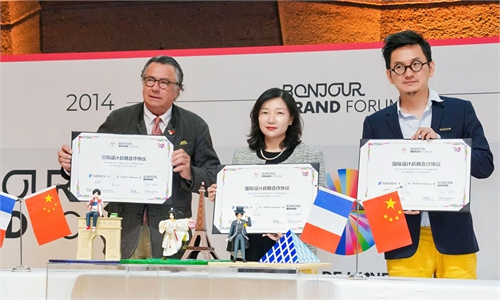ARTS / CULTURE & LEISURE
Chinese, Uzbek archeologists discover 8th century BC settlement

Chinese, Uzbek archeologists work on archaeological site. Photo: Courtesy of Northwest University
With the mutual efforts of archaeologists from both China and Uzbekistan, an ancient settlement dating back to the 8th century BC was recently excavated in Uzbekistan, near the country's Surxondaryo river, also known as Surkhandarya.
The settlement site is a square-shaped architectural structure that contained multiple areas, which archaeologists have identified at a kiln and garbage pits.
Several smaller square rooms were also found within the ruins of the settlement. Archaeologist He Jierao told the Global Times that those spaces were likely "ancient kitchens or living rooms" since large amounts of pottery wares were also discovered nearby.
Utensils made of stone such as a millstone, mortars and pestles were discovered, revealing the "food processing history of ancient people in the region," He told the Global Times.
"It reveals the evolution of ancient people's community lifestyles and how they developed more civilized lifestyles," He emphasized.
The project was launched by archaeologist Ma Jian and his team at Northwest University in Xi'an, Northwest China's Shaanxi Province. Excavation work on the settlement started in April.
Including the site, Chinese and Uzbek experts have made a total of three discoveries in the Central Asian country from April to June.
Another project is an investigation into the ancient Kushan Empire. The remains of six Kushan Empire buildings and 25 ancient tombs were discovered through the joint efforts of Chinese and Uzbek archaeologists.
Established in the early 1st century by the nomadic Yuezhi people, the Kushan Empire was a powerful regime that spread widely to cover areas including today's Uzbekistan, Afghanistan and Pakistan.
"Such a discovery provides reference for establishing the chronological timeline of the ancient Kushan culture in this particular area. This also helps us to picture the trajectory of the development of civilization around the Surxondaryo Region," archaeologist Wang Meng told the Global Times.
For the other project, archaeologists worked mainly around the Fergana Valley in eastern Uzbekistan. A total of 84 ruins near the area have been explored and reviewed during April and May. One precious cliff painting was discovered, which helps experts paint a picture of the ancient culture of the Uzbekistan's Namangan Region.
These fruitful discoveries are the newest updates to Northwest University's long established archaeological partnership with Uzbekistan since 2009. As of 2024, more than 70 joint works have been carried out in Central Asian countries. Such projects aim to study the ancient Silk Road exchanges between China and Central Asia.
Wang Jianxin, a leading figure among the first-batch of archaeologist to work in Uzbekistan 15 years ago, told the Global Times that the two countries' archaeological collaborations have "challenged the Western centralized interpretations of ancient Silk Road culture," while also enhancing the world's understanding of China's contribution to ancient Silk Road civilization.
Now that the China-proposed Belt and Road Initiative (BRI) has enhanced the trust between China and Uzbekistan, cultural scholar Fang Gang told the Global Times that the future of the two countries' archaeological exchanges will "massively rely on educational institutions and scholarly groups at higher education facilities."
"The story of the ancient Silk Road is transforming into today's BRI to strengthen the ties between China and Central Asian countries," Fang emphasized.
In 2018, Northwest University's Collaborative Research Center for Archaeology of the Silk Road was established. As of 2023, the center had launched joint programs with 17 higher education facilities in eight countries, including Kazakhstan and Tajikistan.



